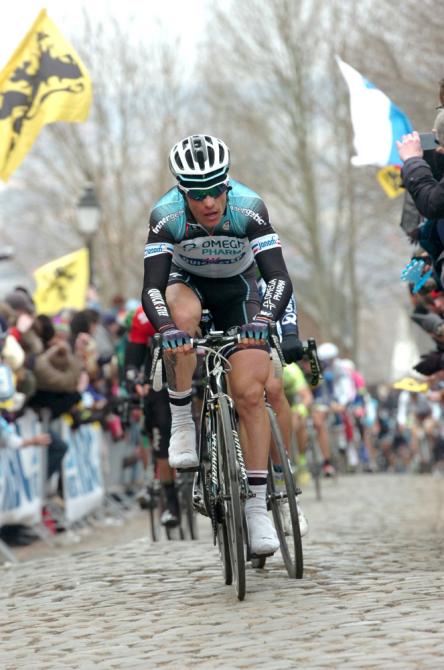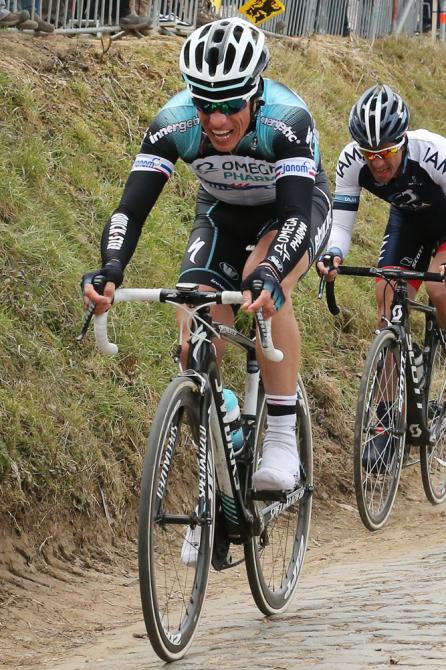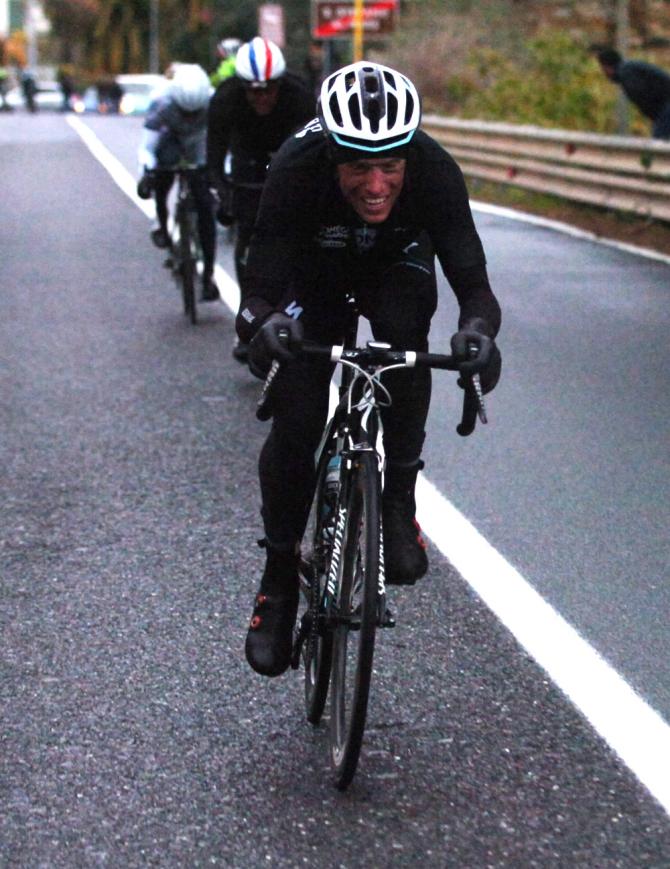Chavanel accepts the law of the strongest
New Flanders course inhibits attacking, says Frenchman



There is something of the stoic about Sylvain Chavanel and he bore a resigned grin when he emerged from the Omega Pharma-QuickStep bus to talk to reporters after Sunday’s Tour of Flanders.
Chavanel had been tipped beforehand as perhaps the man most likely to upset the Fabian Cancellara-Peter Sagan duopoly, but the law of the strongest prevailed. When Cancellara and Sagan powered clear on the Oude Kwaremont, Chavanel was unable to follow and ultimately finished 13th in the main chase group, some 1:39 down.
“I don’t think I have much to regret about the way I rode today,” Chavanel said. “The two strongest riders went away. I was on Edvald Boasson Hagen’s wheel when they went away and I was left behind, but they were the two strongest riders in the race.”
Moments earlier, Omega Pharma-QuickStep manager Patrick Lefevere had told reporters that he would have preferred if Chavanel had looked to anticipate Cancellara and Sagan’s move by going on the attack before the final circuit over the Kwaremont and Paterberg.
“Could I have attacked sooner? No, because people talk about me a lot now and they’re less inclined to let me get away,” Chavanel said and then laughed hollowly: “I have to accept this position.”
Chavanel added that attacking from distance [as he did en route to his second place finish in 2011] has become rather more complicated since the introduction of the new course the following year. With its three circuits over the Oude Kwaremont and Paterberg, the Oudenaarde finish seems to reward raw strength but leaves little room for ingenuity.
“On the parcours, it played out exactly the way it did last year. The circuit is so hard that in effect it blocks the race,” said Chavanel. “I think that the same scenario is going to repeat itself [in the future]. But I like this circuit too. It’s a grand show for the media and public, and that’s part of modern life.
Get The Leadout Newsletter
The latest race content, interviews, features, reviews and expert buying guides, direct to your inbox!
“There was nothing that unfavoured me really. Against Cancellara and Sagan, you just needed to have their legs to follow them. I wasn’t missing a lot – I came over the top of the Kwaremont in 4th position, so that means I was going well.”
Defending champion Tom Boonen’s race was ended by a crash inside the opening hour of racing, but Chavanel said that the absence of his teammate changed little about his tactical approach. “I don’t think so, because on this course, it’s all decided late on,” Chavanel said. “If he hadn’t crashed, he would have been up there with the best of course. Unfortunately, that’s part of the race, as we saw last year with Cancellara.”
Paris-Roubaix
Fabian Cancellara’s show of force in the finale of the Tour of Flanders – not to mention the absence of Boonen and Sagan – means that the Swiss lines up at next Sunday’s Paris-Roubaix as the overwhelming favourite for victory. Chavanel acknowledged that Cancellara is not going to be matched for strength on the rocky road to Roubaix.
“Cancellara will be hard to beat at Paris-Roubaix, but you can’t go into a race thinking you’re beaten already,” Chavanel said. “It will certainly take strategy to beat him. Today, we didn’t see a race with a lot of attacking or with a lot of his rivals off the front, but that was also because he had a very solid team and that allowed him to manage the race very well.”
Paris-Roubaix has never been especially kind to Chavanel, whose best finish in the famous old velodrome was 8th in 2009, but he tried to strike an optimistic note as he left Oudenaarde on Sunday afternoon. While the Tour of Flanders was locked in something of a stalemate until the finishing circuit, Chavanel believes the Hell of the North will be a more open race.
“If you’re very strong at Paris-Roubaix, the selection makes itself naturally,” Chavanel said. “In Flanders, you have to fight for position a bit more as the roads are more narrower. In Paris-Roubaix, the pavé sectors are quite long so the selection comes about more quickly.”

Barry Ryan was Head of Features at Cyclingnews. He has covered professional cycling since 2010, reporting from the Tour de France, Giro d’Italia and events from Argentina to Japan. His writing has appeared in The Independent, Procycling and Cycling Plus. He is the author of The Ascent: Sean Kelly, Stephen Roche and the Rise of Irish Cycling’s Golden Generation, published by Gill Books.